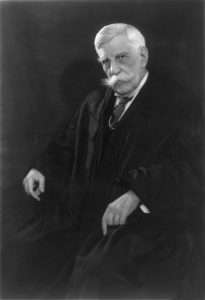The Volokh Conspiracy
Mostly law professors | Sometimes contrarian | Often libertarian | Always independent
Today in Supreme Court History: January 12, 1932
1/12/1932: Justice Oliver Wendell Holmes resigns from the Supreme Court.

Editor's Note: We invite comments and request that they be civil and on-topic. We do not moderate or assume any responsibility for comments, which are owned by the readers who post them. Comments do not represent the views of Reason.com or Reason Foundation. We reserve the right to delete any comment for any reason at any time. Comments may only be edited within 5 minutes of posting. Report abuses.
Please to post comments


United States v. Booker, 543 U.S. 220 (decided January 12, 2005): invalidating part of Federal Sentencing Act that empowers judge to find aggravating factors; making increased sentencing dependent on finding of fact means jury must find those facts, and beyond reasonable doubt (here, sentencing judge found facts of greater amount of cocaine than was presented to convicting jury)
Sipuel v. Board of Regents of University of Oklahoma, 332 U.S. 631 (decided January 12, 1948): it's a denial of Equal Protection for state-run law school to refuse admission to qualified applicant on account of race. A short per curiam opinion, but in my view this case marks the beginning of the civil rights era.
United States v. Windom, 137 U.S. 636 (decided January 12, 1891): federal government can't stiff contractor to whom it had certified payment by bringing up past claims against him
Illinois v. Wardlow, 528 U.S. 119 (decided January 12, 2000): police could stop and search man who had run upon seeing them in area known for heavy narcotics trafficking (this reminded me of a case that arose near where I was living at the time, United States v. Bayless, 913 F. Supp. 232, 1996, where the judge invalidated the stop: "Residents in this neighborhood tended to regard police officers as corrupt, abusive and violent. Had the men not run when the cops began to stare at them, it would have been unusual." The judge also pointed out that three supposedly suspicious facts -- out-of-state plates, double parking, and being about late at night -- are actually quite commonplace in that part of Manhattan.)
El Al Israel Airlines, Ltd. v. Tsui Yuan Tseng, 525 U.S. 155 (decided January 12, 1999): person improperly searched prior to boarding foreign airline has no claim against the foreign airline, either under local law or Warsaw Convention
Booker doesn't make Blackman's list? Does his book forget to cover it?
I remember a case, but not the citation, where the judge remarked that looking at police and looking away from police were both said to be indications of a guilty conscience justifying a search.
Sipuel didn't make it either. OU created a school of law at Langston University. It took a separate decision to open up the main law school to black students, though dining place, water fountains, etc., were still segregated well into the 1960s.
In the civil rights field, I would nominate Missouri ex. rel. Gaines v. Canada, where the Court – in 1938 – decided that from now on they’d enforce the “equal” part of separate but equal, and if segregated facilities weren’t actually equal they’d order integration.
Specifically, having a white law school and offering out-of-state scholarships to black law students wasn’t actually equal.
https://supreme.justia.com/cases/federal/us/305/337/
Once the Court began looking at the “equal” part of separate but equal – at the demand of the NAACP – they kept finding inequality (surprise!) until finally in 1954 they dropped the attempt to square the circle and decided segregated education was inherently unequal. Later applied by implication to other forms of segregation.
IMHO, the very fact of treating citizens differently based on race is the evil which the 14th Amendment is meant to rectify. I hardly think it necessary to speculate on whether racial segregattion could ever be good, because such an inquiry *concedes too much* to the segregationists, whose position intrinsically involves inequality, which is itself a legal harm all by itself.
Trying to buttress the case against segregation with various sociological and educational theories was too much of a concession to the segregation forces, if you ask me.
Thanks!
I pointed out to my Con Law professor that, in the Brown case, the Clarks’ famous experiment with the white and black dolls was not valid. Children prefer the familiar, and the Clarks could simply have been measuring the fact that the children had seen a lot more white dolls than black. (If it had been boxing dolls — sorry, “action figures” — the children might have chosen the black one.)
Wardlaw reminds me of Full Metal Jacket:
“If they run, they are VC. If they stand still, they are well disciplined VC.”
I work at the University of Oklahoma. Ada Sipuel went on to become a Regent at the University of Oklahoma and has a prominent garden in her honor at the north end of the University.
That's very gratifying to know. Thanks!